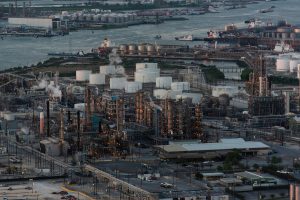
When refineries and other chemical facilities are forced to shut down and restart due to inclement weather, such as was the case with Hurricane Harvey, they release additional harmful pollutants. If they wait too long to cease operations, weather-related impacts, such as power outages, can exacerbate the situation, emitting more pollution and impacting public health.
While petrochemical plants farther south along the Texas coast minimized their pollution by shutting down pre-emptively as Hurricane Harvey approached a year ago, industries in the Houston region waited more than three days after the governor’s August 23 disaster declaration before shutting down for safety reasons. The EIP report, “Preparing for the Next Storm,” uses public records to analyze the handling of these issues by government and industry.
The report provides a detailed timeline of industrial plant shutdowns after the governor’s warning as the heavy rains hit; state and industry data and maps of all the top air and water pollution sources reported during the storm in the Houston area, Corpus Christi, and Beaumont-Port Arthur; and a breakdown of types of pollution released and causes of industrial failures during the storm.
The analysis also concludes with recommendations for improving safety and reducing storm-related pollution in the future.


